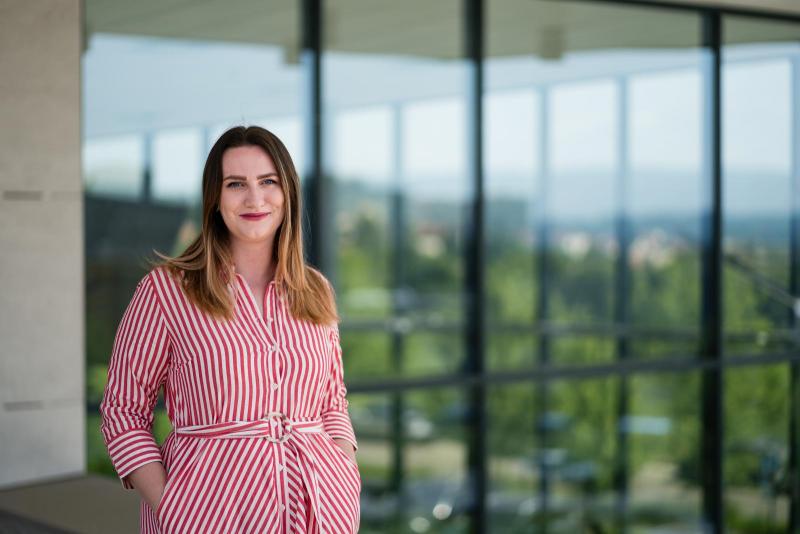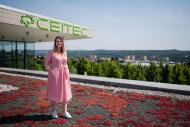People
Michaela Vojníková: Popularizing science is important. Whoever doesn't understand this is working against themselves

The promising scientist Michaela Vojníková from CEITEC BUT is gaining one success after another. She is harvesting the fruits of her labour quite quickly. Whether in the field of science popularization, research or mentoring students. But first she had to fight with herself. She suffered from a lack of healthy self-confidence, and still doesn't like to "show" herself. But she said there was no other way to do it when it came to popularizing science. She launched a science podcast in June, and in the meantime, she is excited that her research cures tumors without burdening the immune system.
Why did you decide to popularize science?
It was a series of events that more or less drove me to do it. I finished my master's degree with a very interesting thesis. I liked to tell everyone about it, especially my parents, to whom I tried to present everything in a way that they would understand. And everybody liked it very much. That's why I decided to take part in the Falling Walls Lab competition. The challenge is that we have to present our research in three minutes. Which is exactly the principle of popularization. Keep it simple and brief, because it's for a broad audience. It's very complicated for scientists because research is not simple.
It seems to me that scientists often think that this "simplifies" their work.
Yes, unfortunately not every scientist is a fan of popularization. It is complicated to find just the main points. For me, it was a challenge. I made it to the final of the Czech round and I won! Which was a shock. I didn't go in expecting to succeed. I often struggle with myself, with low self-esteem and basically what I think every woman struggles with. Winning gave me a boost, a healthy confidence boost. I qualified for the international round, where I met scientists across countries, for whom it is quite common and normal to popularize their work on social media.
That was when you started your Instagram account Chémia života?
Not quite, but I started sharing scientific topics on a private IG account. That's where I stumbled a bit, though, because my friends told me that there was a bit too much science. So I slowed down. I started Chémia životalater on, when I was approached by the BUT after winning the competition and asked if I would like to represent the university in the next competition. This time, I had to make a three-minute video about my research. And I had a lot of fun doing it! I played around with the graphics and editing and that's when I decided to start Chémia života. It's been a year now and almost 1700 people follow the profile.
How much of your time is consumed by popularizing science?
It's time consuming because I'm not just promoting my research. I also open up topics that I'm not an expert on, so I have to study them first. I usually retrieve the information on Saturday and compile everything into a post on Sunday.
Are you sometimes surprised by anything when you study topics?
All the time. Every post is often a surprise to me. Either I didn't know it or I had experienced it differently. Specifically, for example, the topic on hormonal contraception. I decided to share my story, but I also wanted to remain objective on the issue. Although my experience with HC has changed me quite a bit.
How specifically?
Hormonal fluctuations, atopic eczema, frequent crying, anxiety, feelings of hurt and fear. My psychological state had reached a point by then that I was contemplating suicide. Fortunately, my mother noticed the change in my nature and eventually banned me from contraception. Told me to stop it. Fortunately, she was so observant and didn't think it was a sign of puberty.
Luckily! How did viewers react to such a powerful story?
I got some negative reactions, which scared me quite a bit at the time. But those were few and far between. Then I got dozens to hundreds of stories where women described going through the same thing. Which was a shock to me because I thought it was just my unique experience. I reckoned that 9 out of 10 women who wrote to me had a negative experience with HC.
And what about the negative reactions?
I had a few ladies write to me saying I was biased and that I should delete the post because I was just spreading fear. I know the positives of birth control, but I still think there are other options out there for not getting pregnant. I shared the post to show that HC can have unpleasant effects too. To tell girls to find out information and consult a professional and parents. And not to get it written down just because they will have nice skin.
I think it's good that you pointed out what it can cause as well. What age group follows your profile the most?
The 15–18 year olds are the most numerous followers, which is why I thought it was appropriate to bring this topic up.
How is the Czech or Slovak scientific community dealing with the popularization of science?
I would like to see it becoming more important. Popularizing science can help improve people's quality of life and solve the challenges we face as a society. Scientists often don't realise that when they refuse to popularize, they are actually working against themselves. Better informed people may be more willing to support and fund research. It increases scientific literacy, meaning that popularization helps people to think critically, to evaluate arguments. Which would have been useful, for example, during the covid pandemic, when society was unnecessarily polarised. And I could go on. But instead, I often find that even my colleagues despise popularization. They think I just want to show off and demonstrate, but I absolutely refuse that. Maybe it has something to do with the Czech and Slovak nature, because science popularization is common abroad.
So what is your engine?
I mainly want to motivate young people to do science. I myself wanted to be a doctor, but only because I was afraid of financial insecurity – that as a scientist I would have no money. That's why I try to show that science is great and financially interesting if you are smart.
Is it working?
I'm so happy it's working! Because now one of my IG followers is coming via the Erasmus programme, and she wrote to me saying that I do great research and that‘s why she decided to join us. I‘ve also attracted an undergrad student. I think this is the way to go. We are a completely different generation to our parents. We were basically born with a cell phone in our hand and we get our information from there. Nobody reads scientific articles. I don't think that's fun for a "normal" person. Except for me, I guess (laughs).
Were there moments when you wanted to quit? Because of the negative reactions from followers or colleagues?
That's what I thought after the hormonal contraception post. I had to prepare myself that the more followers I had, the more reactions and "haters" I would get. But I think I can handle it. The idea that I can get young people motivated about science is more powerful. As for my colleagues, my biggest supporter is my supervisor, Associate Professor Zbyněk Heger, who responds to every post and survey. He's my most loyal fan (laughs). I'm genuinely happy about that.
What post had the biggest impact?
The one about contraception, of course, and then the fate of the chocolate Easter bunny (laughs), which I used to try to explain in simple terms how the digestive system works.
Aside from Instagram, you also have the podcast "Chci vědět"...
That's right. Instagram is great, but you can still go more in depth in a podcast. I'm going to try to integrate every scientific topic into the story in some interesting way, which is what I enjoy most about the job – making science fun. The Chci vědět podcast will be co-hosted by a colleague of mine. He will stand in the role of the wise man, presenting the facts and I will simply explain them. We've got a few episodes lined up, and we released the pilot on the first day of June.
What topics will you cover?
The lack of financial evaluation of academics and PhD students in universities has now been very much discussed. We have specifically focused on scholarships for PhD students. We interviewed two guests and tried to explain with them what all PhD study entails and why the money is needed. We plan to invite other guests, big names in the scientific community. This will be a little more difficult, but I hope they will eventually accept the invitation. I'd like to ask them what has been bothering them during their college life. I don't believe they've done everything well. I'm sure they've also had downs that have made them stronger in the end.
Let's get to your research. You are a Ph.D. student in Advanced Nanotechnology at CEITEC BUT and you also work at Mendel University in the nanomedicine laboratory. What are you doing now?
In the laboratory I focus on the production of lipid nanoparticles, so-called liposomes. Think of it as a round, double-layered cage that can be opened, closed and used as a pharmaceutical vehicle. In my research, I'm playing with the parameters of the nanoparticles – so that the human body can accept them. I've developed what we call theranostic nanoparticles. These not only heal, but are also detectable by magnetic resonance imaging. Which is quite a breakthrough, because it allows us to see how they move in the body. I'm trying to enclose cytostatic cancer drugs in this "cage". We're focusing on breast and brain cancer right now.
What's the advantage of knowing the path of nanoparticles in the body?
We can see where they act. And for the public's confidence in this type of treatment. Think of the covid pandemic and the vaccine. There was concern because no one knew exactly where the nanoparticles were going and where they were working. That's what we want to avoid. We know exactly where they accumulate most – in the liver, the spleen, but also in the tumour. It's called the EPR effect – cancer disrupts veins and blood vessels to take in as many nutrients as possible, but in doing so it also "unwittingly" takes in nanoparticles. Fortunately, they can't detect it. So this is how we're treating breast cancer now.
How are you trying it and with what results?
We're trying it on mice now. We have mice with tumors and we're using MRI to track the fate of the nanoparticles. I'm very excited, and maybe that's why I'm really passionate about this science, because I'm seeing progress incredibly fast. In my second year I was able to move my research to the stage: mice. So currently we have created a breast tumour in a mouse and we are watching how it shrinks thanks to the nanoparticle treatment. Except we've chosen a very aggressive tumour that even conventional strong chemotherapy drugs can't cure. I'll have to try to lock in stronger drugs.
Would that mean that patients would not need to have surgery?
That's the goal. That's why I chose breast cancer, because of course women suffer so much more when they have to have their breast removed. In addition to battling cancer, they also struggle with aesthetics, sexuality, femininity in general, and self-perception. And this way we could treat her without her having to have surgery. Plus, with MRIs, we'd know where the nanoparticles are, whether we need to inject more or just enough. This is also a common problem, that the patient actually "overdoses" during the treatment and loses their natural immunity – his hair falls out and he is on IVs. When there is a high concentration of nanoparticles in the body, they enter healthy cells and destroy them. We want to streamline all of this and reduce the side effects.
So the patient wouldn't know anything? No change or signal that a treatment is underway?
Well, as for the mice, they're not losing weight, which means their immune systems aren't weakening. So if it worked that way in humans, it would be a pretty simple treatment.
What's the next step? A pilot project with human tumors?
I don't think that's gonna work in the Czech Republic. It's sad that we don't work with hospitals very much. It works better abroad. In our country, you usually make a patent and sell it. I have an ambition to go abroad after my PhD to try it out.
How is your work different from rival research on cancer treatment using lipid nanoparticles?
There's a lot of competition. My contribution lies in two innovations. The first one I already mentioned, the visibility of the nanoparticles on MRI, which allows us to achieve a "customized" treatment. The second is stability, which is also very important. My nanoparticles can be transported between the pharmaceutical company and the hospital at room temperature and will not break down.
Are you going to any conferences with your research?
Yes, I would like to present the results of my work at the CLINAM conference in Basel, Switzerland in October. There will be a big name among the speakers this year – Pieter Cullis, who has a great chance of winning the Nobel Prize. I wanted to do an internship with him, but unfortunately he is from Canada, and the Fulbright scholarship I want to apply for does not cover that. Still, I would have loved to have had a chance to at least talk to him at the conference. I'm really looking forward to it!
What other properties should your nanoparticles ideally have?
I'm in contact with an American scientist who is interested in having me do an internship with him. If it works out, I mean if I get a Fulbright scholarship, then my liposomes would be smart too. They'd be robots that move around in the body on their own. That's sort of my holy grail.
Author: Kristýna Filová, CEITEC BUT
CEITEC scientist creates 3D model of a rare cave-dwelling salamander to facilitate its research
“I expected chaos, dirt and mess,“ says a researcher from CEITEC BUT who taught children in the Himalayas
BUT has its JUNIOR STAR. Young scientist begins to build her own team
PROFiBONE: A groundbreaking material for biomedicine is being developed. It can be used to 3D-print bone replacements
Villain or Hero? The Electron Microscope as a Detective

